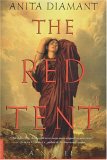Summary | Excerpt | Reading Guide | Reviews | Readalikes | Genres & Themes | Author Bio

Leah had dreamed once of a pomegranate split open to reveal eight red seeds. Zilpah said the dream meant she would have eight healthy children, and my mother knew those words to be true the way she knew how to make bread and beer.
Leah's scent was no mystery. She smelled of the yeast she handled daily, brewing and baking. She reeked of bread and comfort, and - it seemed to Jacob - of sex. He stared at this giantess, and his mouth watered. As far as I know, he never said a word about her eyes.
My aunt Zilpah, Laban's second-born, said that she remembered everything that ever happened to her. She laid claim to memories of her own birth, and even of days in her mother's womb. She swore she could remember her mother's death in the red tent, where she sickened within days after Zilpah arrived in the world, feet first. Leah scoffed at these claims, though not to her sister's face, for Zilpah was the only one who could cause my mother to hold her tongue about anything.
Zilpah's memory of Jacob's arrival is nothing like Rachel's or Leah's, but then Zilpah had little use for men, whom she described as hairy, crude, and half human. Women needed men to make babies and to move heavy objects, but otherwise she didn't understand their purpose, much less appreciate their charms. She loved her sons passionately until they grew beards, but after that could barely bring herself to look at them.
When I was old enough to ask what it was like on the day that my father arrived, she said that the presence of El hovered over him, which is why he was worthy of notice. Zilpah told me that El was the god of thunder, high places, and awful sacrifice. El could demand that a father cut off his son-cast him out into the desert, or slaughter him outright. This was a hard, strange god, alien and cold, but, she conceded, a consort powerful enough for the Queen of Heaven, whom she loved in every shape and name.
Zilpah talked about gods and goddesses almost more than she spoke about people. I found this tiresome at times, but she used words in the most wonderful ways, and I loved her stories about Ninhursag, the great mother, and Enlil, the first father. She made up grandiose hymns in which real people met with the deities and together they danced to the sound of flutes and cymbals, singing them in a high, thin voice to the accompaniment of a small clay drum.
From the age of her first blood, Zilpah thought of herself as a kind of priestess, the keeper of the mysteries of the red tent, the daughter of Asherah, the sister-Siduri who counsels women. It was a foolish idea, as only priests served the goddesses of the great city temples, while the priestesses served gods. Besides, Zilpah had none of the oracle's gifts. She lacked the talent for herbs, and could not prophesy or conjure or read goat entrails. Leah's eight-seeded pomegranate was the only dream she ever interpreted correctly.
Zilpah was Laban's daughter by a slave named Mer-Nefat, who had been purchased from an Egyptian trader in the days when Laban still had means. According to Adah, Zilpah's mother was slender, raven-haired, and so quiet it was easy to forget she had the power of speech, a trait her daughter did not inherit.
Zilpah was only a few months younger than Leah, and after Zilpah's mother died, Adah gave them suck together. They were playmates as babies, close and loving friends as children, tending the flocks together, gathering berries, making up songs, laughing. Apart from Adah, they needed no one else in the world.
Zilpah was almost as tall as Leah, but thinner and less robust in the chest and legs. Dark-haired and olive-skinned, Leah and Zilpah resembled their father and shared the family nose, not unlike Jacob's - a regal hawk's beak that seemed to grow longer when they smiled. Leah and Zilpah both talked with their hands, thumb and forefinger pressed together in emphatic ovals. When the sun made them squint, identical lines appeared around the corners of their eyes.
Copyright Anita Diamant 1997. All rights reserved. Reprinted with the permission of the publisher, St Martin's Press.
Your guide toexceptional books
BookBrowse seeks out and recommends the best in contemporary fiction and nonfiction—books that not only engage and entertain but also deepen our understanding of ourselves and the world around us.